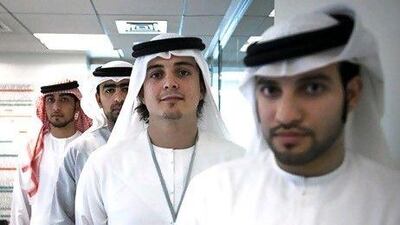When Omar Kazim was a little boy, he dreamt of becoming an astronaut or a mad scientist.
Fortunately for Mr Kazim, outer space won. Although he will not be suiting up for Nasa in the near future, he puts his skills as a flight dynamics engineer to good use for Yahsat, Abu Dhabi's first commercial satellite company.
"My job is to make sure that the satellite stays in orbit and doesn't veer off course. It is actually more complicated than it sounds," he says. "I do a lot of maths calculations to make sure everything is OK and there are no eclipses, debris or gravity effects that could shorten the satellite's life expectancy. It's no mad scientist, but it's still in the science field."
Yahsat, which is part of Mubadala Development, a strategic investment company owned by the Abu Dhabi Government, plans to launch its first satellite in the next two months, with a second expected in orbit in the second half of this year.
The satellite will provide a range of commercial television and broadband internet services as well as communications tools for the defence sector across the Middle East and Africa.
Mr Kazim is one of several UAE nationals who represent the future of the country's technology sector.
As part of Abu Dhabi's goal to create a range of sustainable industries outside of the petroleum sector, the emirate has invested billions of dirhams to foster the development of a sustainable-technology and telecommunications industry.
"The UAE is investing to be at the forefront of a lot of industries and I feel really proud that we're going in the right direction," Mr Kazim says. "These are small steps to make it to our main goal."
Nayef Qassim Shahin, Mohamed al Kaabi and Hamad al Hamadi are also part of a team that takes the 30-minute drive out of Abu Dhabi to work at Yahsat's mission control station. All have spent the past year training for the launch to make sure the "bird" remains in orbit and functioning.
Mr Shahin, a telecommunications spectrum engineer, says he could have worked in the US or Canada but was attracted to the start-up company in his home country.
"This project just felt special," Mr Shahin says. "It's now a long-term thing for me. This is the start of the whole space and telecommunications industry. Hopefully, in time we'll have our own space agency."
Mr Shahin believes the UAE is already making an impact on the international stage. He is the company's point man in co-ordinating with the International Telecommunication Union the radio frequencies Yahsat will be allotted for its satellite.
"I do a lot of travelling for my job and I'm always surprised when the international community mentions what the UAE is doing in space," Mr Shahin says.
Mr al Kaabi and Mr al Hamadi also have crucial jobs at Yahsat. If anything goes wrong with the satellite, these spacecraft operations engineers will be the ones to inform the rest of the team that there is a problem.
"We're trained for reacting under pressure and making sure that if anything goes wrong, we know the proper protocols to follow in a worst-case scenario," Mr al Kaabi says. "It's a major responsibility for us."
While every member of Yahsat's team has a role, from sales to engineering to mission control, there is a larger goal that the company is trying to accomplish.
Jassem al Zaabi, the chief executive of Yahsat, says the company's ultimate mission is to create a sustainable satellite communication industry in the Emirates. That can be done only by recruiting and training highly skilled UAE nationals for long careers at Yahsat, he says.
"We've had to build our own operation from the ground up and we wanted to make sure that our operation is sustainable. To do that, we needed a good mix of good expertise and fresh UAE talent," Mr al Zaabi says.
Yahsat is one of a handful of technology companies in the Emirates that have committed themselves to bringing local talent into the workforce. The telecommunications companies Etisalat and du have in-house programmes to teach and guide young UAE nationals for engineering and management positions.
"For kids, they can be whatever they want to be. But it's our job to provide a platform and an industry," Mr al Zaabi says. "If you have someone who wants to work in satellite flight dynamics, at least there is a job for them in the UAE."

